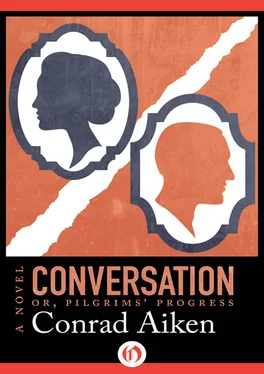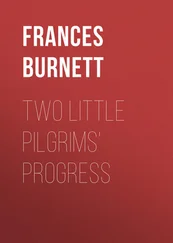“Don’t be silly, I’m not a seed!”
“I wouldn’t be so sure. I might try planting you, you know!”
Amused, intent on this entrancing world of bright images, images like pebbles to be arranged in rows or circles, to be strung like beads, the small blue homespun-clad figure, with doubled fists and lowered golden head, galloped ahead of him like a little horse. She ploughed through the drifts of fog-dampened poplar leaves, yellow and brown; kicked them, trampled on them; alternately raised and lowered her face, singing; half closed the blue eyes to feel the cool fog-drip on her cheeks, in her hair, the hands outspread — good lord, how wonderful, she was living in a world of her own, a burning and secret world of her own. The same world? a different world? A new world — that was it — the world of the poet, the first poet, the poet who saw simultaneously, for the first time, the sea and a flower. What! Dogs and horses in one and the same world—! It was a miracle.…
The letter, when he opened Box 67 with the thin steel key, the blue envelope, addressed with the clear delicate handwriting — the bold T and K, the open-eyed “o’s”—how very odd that her handwriting always made him think of her eyes, as if the blue eyes looked up at him frankly from the envelope itself — the letter, carried in his hand, became at once a part of the indiscreet dream — and not merely an extension of it, but perhaps its very center. The letter, on its way from Boston, pernoctating, keeping its open-eyed vigil, had itself brought the sea change, the soft inland-going sea fog, and had brought, too, the obscure and all-troubling delicious dream, the half-seen sculptural shape of involved struggle, the hand lifted and vanishing, the face darkening as it turned away. Pernoctate — yes, the letter had kept a vigil, its blue eyes open all night, and it was this that had projected the whole thing — its influence had preceded it, even to bringing into his very sleep the half-guessed presence, the half-happy and half-unhappy joining and sundering, the ecstatic but broken embrace. Broken!
The familiar sensation of breathlessness, the heart contracting on itself — and yet it was good, too — whatever the outcome, it was good. Joy either way, freedom either way. Enid had come nearer, she already stood nearer, this was the important, the essential, change; and this would be true even if Nora hadn’t herself yet made any decision. Or even if she had decided not to decide.
“And that’s our old friend the Quaker burying ground,” he said quickly, feeling a little breathless, “with all the little headstones exactly alike — see? — and exactly the same size.”
“ Why , daddy?”
“Well, it’s really rather nice; it’s to remind people not to be too proud, to be humble — no matter what they’ve done, or who they are. Not to boast. You see, the Quakers thought to put up a huge great pompous marble tombstone was like a boast, was like saying, ‘Ho, look at me, how grand I am! Ho, look at me, but don’t pay any attention to that little Smith fellow down there, with that measly little stone of his, like a school slate. Why, you’ve only got to look at his stone to see how unimportant he is!’ See?”
“Yes, but suppose you were a king. Then couldn’t you be proud?”
“Foo! A king. I’m afraid not many Quakers were kings. Or, no, come to think of it, perhaps they all were! And perhaps they all were proud!”
“Well, if I was a king, I’d be proud, and I’m proud any way!”
“You look out you don’t have a fall, like old doctor Humpty-Dumpty. And all the king’s horses—!”
“Ho ho, don’t be silly. Humpty-Dumpty was nothing but an egg! And now come on. And shall we go along the little path by the rope walk and into the woods? To the secret place?”
“Yes, all aboard for the secret place.”
The morning had perceptibly darkened, the sea fog lay close and smothering above the oak woods, the pine trees, the leaf-strewn wood path; above the fog there must be clouds; it looked like rain. A pungent smell of burning leaves rankled in the air, too, the smudge fires of autumn, smoke of the consuming world. On this path, in the snow, in winter — Buzzer on her little red sled, the leggined legs stuck out stiffly before her, going to the golf links — he must remember tomorrow to get the sled out of the cellar, and take a look, too, at the jugs of elderberry wine on the top of the cellar wall. And Paul’s dandelion wine. And the snow shovels.… The woods were silent, dripping; a chickadee chattered angrily, a catbird wailed; and at the secret place — the little hollow of pine needles and pine cones under a solitary great boulder of granite, green-lichened, surrounded by pines — while Buzzer built a house of pine twigs, and stood pine cones around them as trees, he opened the blue letter.
No salutation — no signature. A single sheet closely and neatly written, written calmly and unhurriedly, too, as one could see by the care with which the margins had been kept, the text precisely balanced on the page. The longest letter she had ever written to him — which could have, of course, only one meaning — perhaps it would be better not to read it at all—? The burden of it was already manifest in the sudden closing of his heart.
I think I know how it is with you, I think you will know how it is with me. Do you remember how we met, that first time in Washington Street, after we had come out of the vaudeville theater? I suddenly saw you again on the sidewalk, looking down at me, and I said, well, where did you come from, and you, without even so much as taking your hat off, said Oh, I fell from heaven. As casual as that, and of course if I hadn’t had too many cocktails for lunch at the Touraine there’d never have been any meeting at all. We’ve been very happy, haven’t we? Maybe because it was all just as casual and light as that. And I never felt that I was taking anything away from Enid, or any pangs of conscience, until I began to feel that you were beginning to have pangs of conscience. You have begun, haven’t you? And it’s funny, but I don’t really mind that at all, in fact I like it, for it makes me like you better — not that I didn’t like you anyway — and makes me like Enid better too. And Buzzer. But I expect we both knew it was bound to happen some day, and both kept a little something in reserve, so that when the time did come it wouldn’t hurt too much — isn’t that it?
So, I think you’d better not come to see me any more. And I think you will like to know that I’m going to be married, next month, to the man you talked to on the telephone once, by mistake — remember? — and whose little painting of the Concord River you liked. I hope you’ll be happy, all three of you — I’m sure I’m going to be happy myself — but it was fun, wasn’t it? I shall always be glad it happened, and grateful .
Grateful! Dear delightful Nora grateful ! He began to read the letter again, but found he couldn’t. The words were too good, too true, too tender, the direct and rich honesty was more than he could bear, so much more than he could ever possibly have deserved; and abruptly he felt that if he didn’t shout, or do something violent, he would burst into tears. He sat quite still for a moment, looked up through the red boughs of a pine tree into the gray fog, then suddenly he put out a hand, seized Buzzer by one ankle, pulled her to him, and hugged her passionately.
“She’s grateful!” he shouted. “She says she’s grateful !”
“Daddy, you put me down this instant! Look what you’ve done to my house!”
Читать дальше












